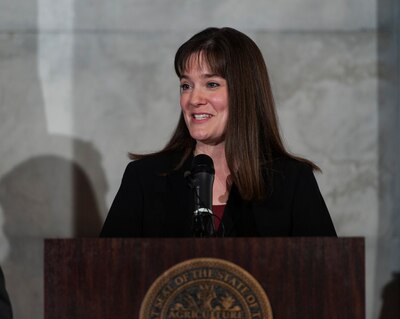After last year’s online testing failure, Education Commissioner Candice McQueen pledged to rebuild trust in Tennessee’s new TNReady assessment, a lynchpin of the state’s system of school accountability.
A year later, frustration over TNReady has re-emerged, even after a mostly uneventful spring testing period that McQueen declared a success just weeks ago.
Preliminary TNReady scores are supposed to count for 10 percent of students’ final grades. But as many districts end the school year this week, the state’s data is arriving too late. One by one, school systems have opted to exclude the scores, while some plan to issue their report cards late.
The flurry of end-of-school adjustments has left local administrators to explain the changes to parents, educators and students who are already wary of state testing. And the issue has put Tennessee education officials back on the defensive as the state works to regain its footing on testing after last year’s high-profile setbacks.
“We just need to get more crisp as a state,” said Superintendent Dorsey Hopson after Shelby County Schools joined the growing list of districts opting to leave out the scores. “If we know that we want to use (TNReady scores), if the state says use them on the report card, then we got to get them back.”
The confusion represents one step back for TNReady, even after the state took two steps forward this spring with a mostly smooth second year of testing under Questar, its new test maker. Last year, McQueen canceled testing for grades 3-8 and fired Measurement Inc. after Tennessee’s online platform failed and a string of logistical problems ensued.
Why TNReady’s failed rollout leaves Tennessee with challenges for years to come
But the reason this year’s testing went more smoothly may also be the reason why the scores haven’t arrived early enough for many districts.
TNReady was mostly administered on paper this time around, which meant materials had to be processed, shipped and scored before the early data could be shared with districts. About 600,000 students took the assessment statewide.
After testing ended on May 5, districts had five days to get their materials to Questar to go to the front of the line for return of preliminary scores. Not all districts succeeded, and some had problems with shipping. Through it all, the State Department of Education has maintained that its timelines are “on track.”
McQueen said Wednesday that districts have authority under a 2015 state law to exclude the scores from students’ final grades if the data doesn’t arrive a week before school lets out. And with 146 districts that set their own calendars, “the flexibility provided under this law is very important.”
Next year will be better, she says, as Tennessee moves more students to online testing, beginning with high school students.

“We lose seven to 10 days for potential scoring time just due to shipping and delivery,” she said of paper tests. “Online, those challenges are eliminated because the materials can be uploaded immediately and transferred much much quicker.”
The commissioner emphasized that the data that matters most is not the preliminary data but the final score reports, which are scheduled for release in July for high schools and the fall for grades 3-8. Those scores are factored into teachers’ evaluations and are also used to measure the effectiveness of schools and districts.
“Not until you get the score report will you have the full context of a student’s performance level and strengths and weaknesses in relation to the standards,” she said.
The early data matters to districts, though, since Tennessee has tied the scores to student grades since 2011.
“Historically, we know that students don’t try as hard when the tests don’t count,” said Jennifer Johnson, a spokeswoman for Wilson County Schools, a district outside of Nashville that opted to issue report cards late. “We’re trying to get our students into the mindset that tests do matter, that this means business.”
Regardless, this year’s handling of early scores has left many parents and educators confused, some even exasperated.
“There’s so much time and stress on students, and here again it’s not ready,” said Tikeila Rucker, a Memphis teacher who is president of the United Education Association of Shelby County.
“The expectation is that we would have the scores back,” Hopson agreed.
But Hopson, who heads Tennessee’s largest district in Memphis, also is taking the long view.
“It’s a new test and a new process and I’m sure the state is trying to figure it all out,” he said. “Obviously the process was better this year than last year.”
Laura Faith Kebede and Caroline Bauman contributed to this report.

